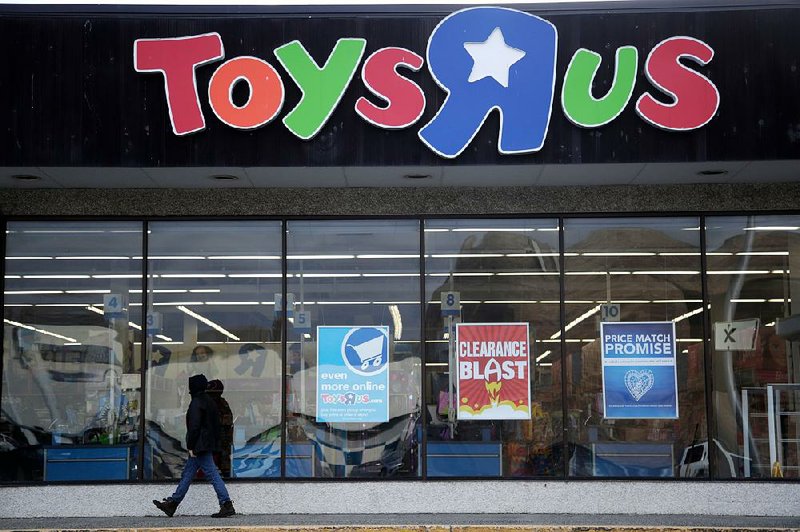Toys R Us stores shut; 30,000 jobs lost
NEW YORK -- Toys R Us is closing its last U.S. stores by today, the end of a chain known to generations of children and parents for its sprawling stores, brightly colored logo and Geoffrey the giraffe mascot.
But many of the children who happily sang the "I don't wanna grow up, I'm a Toys R Us kid" jingle grew into busy parents who found shopping online more convenient. The company, which also owned the Babies R Us chain, was hobbled by $5 billion in debt after a leveraged buyout that left it unable to invest and keep up.
As the last of the U.S. stores close, more than 30,000 employees will be looking for work. Toys R Us' troubles have also shaken some big toy-makers such as Mattel and Hasbro.
Toys R Us filed for Chapter 11 reorganization last fall and pledged to stay open, but had poor sales during the critical holiday season as customers and vendors shied away. In January, it announced plans to close about 180 stores, but then in March it said it would liquidate the rest of the 700-plus stores.
-- The Associated Press
$2.90-a-gallon gas forecast for holiday
Sharply rising crude-oil prices over the past week mean higher gasoline prices in the days leading up to the July 4 holiday, travel club AAA said.
GasBuddy.com projected that July 4 travelers will pay an average of $2.90 a gallon across the nation -- highest for the holiday since 2014.
AAA blamed the higher crude prices on a decline in U.S. oil inventories over the past week; a U.S.-driven push for allies to end imports of Iranian oil by Nov. 4 as part of President Donald Trump's decision to end the 2015 nuclear deal; production challenges in Canada; low crude output from Venezuela and Libya; and a decision by Russia and OPEC countries to increase production at lower rates than expected.
-- Tribune News Service
30-year mortgage slips a bit; 15-year flat
WASHINGTON -- Long-term U.S. mortgage rates were flat to lower this week. The benchmark 30-year rate marked its fourth decline in the past five weeks.
Mortgage buyer Freddie Mac said Thursday the average rate on 30-year, fixed-rate mortgages was 4.55 percent, down from 4.57 percent last week. By contrast, the 30-year rate averaged 3.88 percent a year ago.
The average rate on 15-year, fixed-rate loans was unchanged from last week at 4.04 percent.
To calculate average mortgage rates, Freddie Mac surveys lenders across the country between Monday and Wednesday each week. The average doesn't include extra fees, known as points, which most borrowers must pay to get the lowest rates.
-- The Associated Press
Music copyright bill clears Senate panel
For a decade, the music industry has promoted a motley series of copyright bills to Congress, only to watch them fail.
On Thursday, a new bill, the Music Modernization Act, won the approval of the Senate Judiciary Committee.
Lobbyists said they were confident the bill would be passed by the full Senate and eventually become law. A version of the bill passed the House unanimously in April.
For years, songwriters and music publishers have argued that streaming services have routinely failed to properly acquire mechanical licenses -- the permission to reproduce a piece of music for sale or consumption -- a term that goes back to the days of player pianos. At the same time, Spotify and other companies said that there was no authoritative database identifying who owned what.
The legislation establishes a licensing collective, to be overseen by songwriters and publishers, and paid for by the digital services, with rights information maintained by the copyright owners. Digital services, which now must track down rights holders or file notices in bulk with the Copyright Office, will be able to receive blanket licenses from the collective. In exchange, the services will gain protections against lawsuits.
-- The New York Times
California targets local soft-drink taxes
SACRAMENTO, Calif. -- Soda taxes may stop popping up in California and elsewhere, thanks to a new push by the beverage industry to fight such measures.
California lawmakers passed a bill Thursday to ban local taxes on soda for the next 12 years and sent it to Gov. Jerry Brown, who hasn't explicitly said if he'll sign it. It follows similar bans recently passed in Arizona and Michigan. The American Beverage Association, which represents Coca-Cola, PepsiCo and others, has backed the statewide bans after several cities passed taxes on sugary drinks in recent years.
Voters in Oregon will decide on a similar statewide ban in November.
The California bill would not affect four local soda taxes that were passed in the state in recent years.
It's part of a last-minute deal to block a beverage industry-backed ballot measure that would make it much harder for cities and counties to raise taxes of any kind. The beverage association said in a statement the legislation is about keeping groceries, including drinks, affordable.
-- The Associated Press
Business on 06/29/2018
